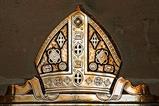Jesus may have fed the 5,000. But did he hit his SMART goals? Michele Guinness looks at the tension between management and ministry

In 2017, after a mere eight years in full time parish ministry, Sarah Mullally was appointed Bishop of London.
Another contender for the post, put forward by Justin Welby, then Archbishop of Canterbury, was Paula Vennells, the already beleaguered CEO of the Post Office, who was ordained, but had no full-time experience of parish ministry whatsoever. However she had led a governance review of the church for the Archbishop, so presumably it was her business rather than ministry skills that had impressed him! Whichever, the Church of England had a lucky escape in the land of growing damage to its reputation (Vennells was later implicated in the Horizon IT scandal).
Over the past few years there has been increasing criticism of the Church of England’s attachment to a business model to promote expansion and growth.
There is no doubt that the former Archbishop, once a senior executive in the oil industry, and unashamedly fast-tracked into the role, seems to have been determined, not to mention appointed, to stem the haemorrhaging from the pews and drag the church into 21st century using the skills he had learned in his previous life. But an Archbishop is not a CEO. Neither he nor his bishops have the power to interfere in parish life, or even preach in a church within their diocese unless they are invited to do so by the vicar. In fact, in a 2018 interview with the Church Times Welby claimed that all he had was, “responsibility without power.” That certainly seemed a little disingenuous during Covid, when suddenly, instructions and edicts arrived in fast and furious succession from the House of Bishops to their clergy, banning them from entering their buildings and forbidding Communion in a home group context. It did appear as if a more centralised approach to management was dictating the culture.
Strategic Development
Some would say the subtle changes began in 1999, when, because of this very real sense of powerlessness, Archbishop George Carey set up the Archbishops’ Council, with a brief to promote the spiritual and numerical growth of the Church and to re-imagine, reshape and re-energise lay and ordained ministry. A more mission-based, business model was needed to halt the demise of what was seen as a dinosaur-age notion of church and transform it into a Phoenix-style rising out of the ashes.
“We can’t simply go on as we are, if we are to flourish and grow,” Welby declared when announcing his new reforms. “Our call is not to manage decline.”
An Archbishop is not a CEO
The all-powerful Church Commissioners, with their oversight of £10bn of church finances, were persuaded to hand over £198 million to the Council to fund a host of creative new projects secured by competitive bidding by the dioceses.
Bidding for grants was hugely labour-intensive. One Bishop commented, “You bid for what you think you’ll get a ‘Yes’ to, rather than what you need.” New worshipping communities such as Fresh Expressions and Messy Church and even diocesan reorganisation unlocked the coffers. But the new Strategic Development Funding Awards were not as successful as Archbishop’s Council had hoped. Between 2014 and 2021 only one third delivered the projected numeric growth. But how to define new “disciples”? Or judge success? This is where the model broke down. Perhaps the third that did appear to be reached was well worth the funding. Not to mention taking the innovative risk.
Growth at Ground Level
However, the swingeing cuts to clergy posts showed up a disconnect between creative national strategies and the financial difficulties faced by many local parishes with damp, decaying buildings and inadequate heating. Would the Church Commissioners favour new projects over modernising existing and struggling buildings and congregations? Many local parishes certainly felt passed over.
Next, the dioceses demanded Mission Action Plans based on SMART goals - specific, measurable, achievable, relevant and timed. All well and good in industry, where a profit-making business relies on market growth. But the church is a living organism, not a factory producing garden gnomes. Chasing numerical growth seemed a burden, rather than a challenge. Where did demography come into play, when the “successful” churches just happened to be in the more well-heeled areas, blessed with nearby universities and a large pool of young people to fish from? In 1998 one church adopted the strapline 2000 by 2000. It didn’t happen. Apparently, the Holy Spirit can’t be reduced to SMART goals either and we lose credibility when we try.
On the other hand, my husband, who had identified a need for both a managerial and pastoral-theological model, pursued management training. He found the Management Action Plan (MAP) a useful tool in clarifying the organisational and financial goals of a church council, and in ensuring a vision for mission, even if it couldn’t measure the quality of corporate worship, communal life, or commitment to prayer and Bible study. Locally there are churches taking school assemblies, bags of food distributed to needy families at festivals, a dementia club, luncheon clubs and warm spaces for elderly, pantomimes, pancake parties, holiday clubs, foodbanks, creative workshops, and an arts centre, all thanks to loving, sacrificial volunteering. All without making a very obvious numerical difference or any funding from the top.
The church is a living organism, not a factory producing garden gnomes
Ministers on the ground need managerial know-how as never before. When ordinands say, “I just want to be a pastor,” I think, “You’ll be lucky. A Jack of All Trades is what’s needed - accomplished in technology, finance, boilers and buildings, sound and lighting, employment law, charity law, communication, demographics, supporting volunteers and safeguarding. Oh, as well as in pastoral counselling and preaching gifts. With an outstanding grasp of theology and its application in multiple situations - marriage, health, redundancy, breakdown, grief. You may even need some grounding in criminal law. In one of our churches, my husband unearthed a fraud of over £60,000.
The Urgency of Excellent Training
Excellence in ministerial training has never been uppermost in the funding stakes. An ordinand’s course is paid for, as are some basic expenses, but there is no living allowance, which pre-determines a lack of candidates.
Neurologist and psychiatrist, Iain McGilchrist believes that every human being is actually looking for “The Ineffable”, in other words the divine spark that could, on a Sunday, open the heavens just enough to transform the working week ahead. But ordinands are manifestly not taught how to choreograph a service, put a human face on their theology, or preach with illustrations that touch the congregation with the numinous of God’s presence. We appeal to the brain and have little time for the senses and emotions or the arts and beauty, though we are whole people, body, mind and spirit. My own journey to faith was through the movie, Ben Hur and the York Mystery Plays. I became a Christian before the process was explained to me. The punters vote with their feet when services are lack-lustre, joyless and with little relevance. The lack of adequate ministerial training bores them out of the pews.
Meanwhile, Welby had been Archbishop little more than a year when the selection of bishops and archdeacons was subjected to an HR model. A report entitled, “Talent Management for Future Leaders and Leadership Development for Bishops and Deans: A new approach,” was produced by a review group chaired by Lord Green of Hurstpierpoint, an ordained Prebendary who was CEO of HSBC at a time when the bank was fined for money laundering and tax evasion. Hardly the best advisor on leadership, but he was ordained, so that was alright!
Potential bishops would be screened by the Archbishop’s Secretary for Appointments, a former senior HR manager for Marks and Spencers, then added to a “talent pool.” A bishop’s wife herself, which was no guarantee of impartiality, her control over the process was paramount though no one knew what her criteria for bishop material actually were. I gather from one candidate that there was no mention of theological proficiency, or even of the Holy Spirit. He was simply told he hadn’t followed a proper career path. “That’s because I haven’t a career, I have a calling,” he replied, happily ruining his chances.
There may well be greater diversity in the church’s leadership in terms of gender and background, but the unintended consequence of having an HR blueprint for a bishop’s job description is a certain monochrome and a lack of diversity in persona…
Which brings us neatly to the problem of identifying a dynamic, new Archbishop, and a consultation of the general public for their suggestions. Perhaps what we need is a wild card, someone who will cut across every expectation of what a bishop should be.
Safeguarding failures
Bishops are not simply senior managers in a hierarchical system. They too have a ministerial calling - to be excellent pastors, teachers, theologians and missionaries, but how can they when so much of their time is taken up with the tortuous, specialist, often heart-breaking issue of dealing with rogue clergy? Especially when the Clergy Disciplinary Measures make it almost impossible for a bishop to sack a minister for misconduct - even if he is a known, yet unconvicted paedophile.
What is needed is an external examining body set up to address formal complaints of misconduct in all its various disguises, to ensure that abuse is identified, the abuser removed from harm’s way and prosecuted if appropriate, autocratic egotists retrained at the very least, victims heard and given proper support, and malicious accusations identified and rejected. An organisation with bite and the ability to act as swiftly as possible to minimise the damage that has already been done. But instead, in February this year the General Synod voted, unbelievably, not to outsource safeguarding scrutiny to an independent organisation. For those committed to the best pastoral care what a vital, missed opportunity to deliver it.
Will the Church of England rise up from the ashes? It’s like the curate’s egg - good in parts, especially where its local and relevant, but for the whole to be renewed and restored a great deal more than importing models from elsewhere is needed. It is too unique an institution for that. A holy alliance between structural change and a work of the Spirit is vital. Let’s hope the new Archbishop has enough imagination and fire in their belly to achieve it. But I have my doubts.






































1 Reader's comment